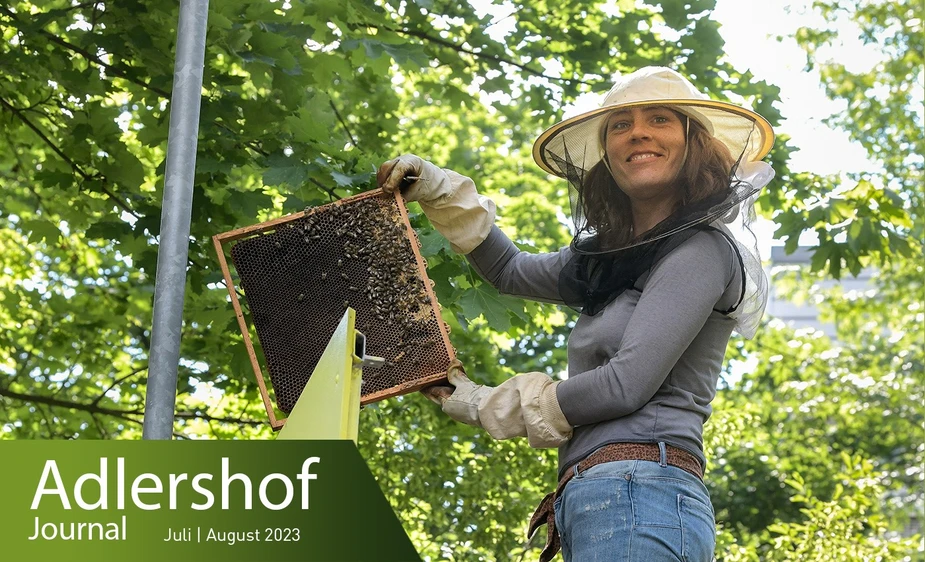In conversation with Virág Major-Kremer
The cultural manager looks after four bee colonies at the Zentrum für Mikrosysteme und Materialien (ZMM)
Four honeybee colonies live on top of four bright yellow high seats in the garden of the Zentrum für Mikrosysteme und Materialien (ZMM). Put there as part of the art project “smart systems” in 2013, they are a perfect example of interconnected microsystems. Since 2019, the ZMM bees have been looked after by Virág Major-Kremer, a cultural manager and researcher who works in Berlin and Budapest. Her main workplace is Haus der Kulturen der Welt, or HKW, a national art centre in Berlin, where she focuses on art as education, the Anthropocene, sustainability, and new perspectives on science (“Sciences after Science”).
Adlershof Journal: How did you get into beekeeping?
Virág Major-Kremer: A friend of mine was involved in an art project in Budapest in 2013 called “Social Honey”. It was about what humans can learn from bees and their perfectly democratic form of organisation. That got me excited. I then started learning about beekeeping with a group of about 20 other people. This was at a time when urban beekeeping was not yet so well-known.
What fascinates you about bees?
Exactly what I mentioned before, their form of organisation, the sophisticated system that makes up a bee colony and its common aim: the survival of the hive. Bees can code and decipher information and have individual tasks that serve the community. I want to understand how they work and how they react when I interact with them. I like the physical aspect of working as a beekeeper. It’s a good balance to mental work, which is predominantly working on a computer. Moreover, as a beekeeper, I become more familiar with nature. I have stronger awareness of the seasons, for example.
When did you start looking after the bee colonies in the garden of the Zentrum für Mikrosysteme und Materialien (ZMM)?
When I arrived in Berlin, I was looking for bee colonies of my own. Through my work, I got to know Erika Mayr, who is an artist, and was able to take over her four colonies in Adlershof in 2019. Additionally, I also look after some bees privately in Pankow, where I live. Beekeeping is a wonderful hobby that I can also pass on to my three-year-old daughter.
How often are you with the bees and what care do they require?
This depends a lot on the season. In the winter, I got to see the bees less and try to avoid opening their houses. Bees require a constant temperature of about 37 degrees for the colony to thrive. In early summer, I check on them weekly, which is also to prevent them from leaving their hive during the swarming season. This is also a good time to increase the population by creating new hives while reducing the swarming instinct and replacing the losses of winter. The season ends in mid-July, and I make sure that their bees and their hive get through winter safely.
How do honeybees fare in the city?
City bees do well. They find enough pollen and nectar because of the large diversity of plant food species. City dwellers do gardening in the smallest of areas, on balconies and in allotments, there are many different trees ...
In fact, bees in rural areas sometimes have it worse; they depend on special pollen that is less available to them due to monocultures in agriculture and the increased sealing of land.
How much honey do you harvest from the ZMM bees?
Last year it was 75 kilograms. The bees need some of it as food in winter and some of it goes to the companies based at the technology centre.
Peggy Mory, Adlershof Journal
- LinkedIn Virág Major-Kremer
- Art-Project ZMM
